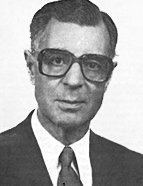

Can we therefore infer that his own historiography does not reveal any ideological influences? That cannot be said. Expressing himself through writing and words that were sometimes difficult to interpret (particularly in his “ master classes ” , as he himself said, but not in his seminars, where he simply sought to sow the seeds of knowledge that each student was discovering), his vision of the university as situated between a logic of competence and a logic of intervention, his religious tensions that came from a neo-Thomist and social Christianity that later turned to a social and progressive Catholicism, and even his shift towards a political conception of social democracy were still evident. But the presence of ideology emerges more as a cultural sense than a ‘partisan’ one, since no historian can free himself from ideology as a form of culture. And this culture was always the idea pursued, sometimes contradictorily or in an apparently contradictory way, by Silva Dias. He never managed to stop interpreting history as a science that presupposes a complex cultural background, just as he never stopped thinking of the University as a space for communication, based on science but also, in a very broad sense, on culture.
Bibliografia activa : Portugal e a Cultura Europeia , Coimbra, Biblos, 1952, e Porto, Campo das Letras, 2006; Correntes do sentimento religioso em Portugal (Séculos XVI-XVIII) , tomo I com 2 volumes, Coimbra, Instituto de Estudos Filosóficos, 1960; A política cultural da época de D. João III , Coimbra, Instituto de Estudos Filosóficos, 1969; Braga e a cultura portuguesa do Renascimento , Coimbra, Seminário de Cultura Portuguesa, 1972; Os Descobrimentos e a problemática cultural do século XVI , Coimbra, Seminário de Cultura Portuguesa, 1973, e Lisboa, Presença, 1982; Individualismo e racionalismo em Portugal (1840-1870) , Coimbra, Seminário de Cultura Portuguesa, 1973; Os primórdios da Maçonaria em Portugal , tomos I e II, em 4 volumes, Lisboa, INIC, 1980, com a colaboração de Graça Silva Dias; “Avanço cultural e avanço maçónico, na segunda metade do século XVIII”, Revista de História das Ideias , vol 1, 1977, pp. 395-417; “O vintismo: realidades e estrangulamentos políticos”, Análise Social , 16, 61/62, 1980, pp. 273-278; “A revolução liberal portuguesa: amálgama e não substituição de classes”, in Miriam Halpern Pereira (coord.), O liberalismo na Península Ibérica na primeira metade do século XIX , vol. I, pp. 21-25; Camões no Portugal de quinhentos , Lisboa, Instituto de Cultura e Língua Portuguesas, 1981; “Pombalismo e teoria política” e “Pombalismo e projecto político”, Cultura, História e Filosofia , vol. I, 1982, pp. 45-114, vol. II, 1983, pp. 185-318, e III, 1984, pp. 27-151.
This work is financed by national funds through FCT - Foundation for Science and Technology, I.P, in the scope of the projects UIDB/04311/2020 and UIDP/04311/2020.
